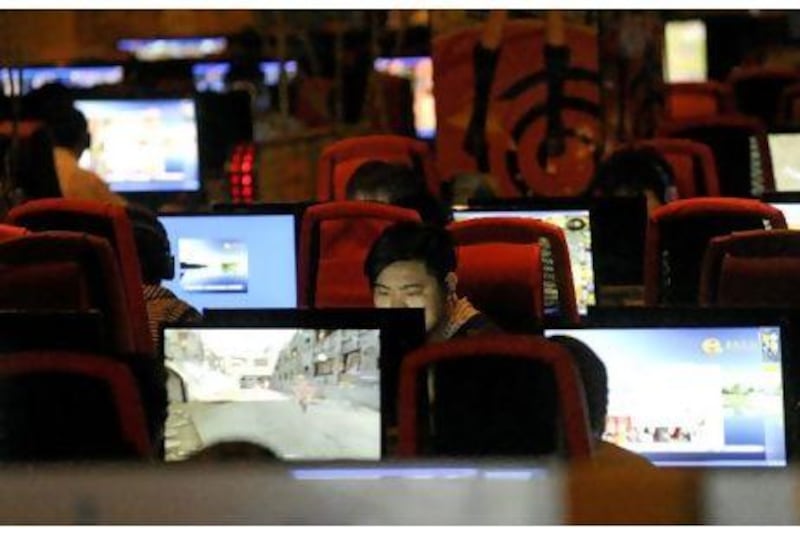BEIJING // A Chinese man died this week after spending months living in an internet cafe and playing an online game around the clock.
Wang Gang, 31, collapsed in a gaming parlour in the city of Wuhan in Hubei province on May 6 and died on Monday from cardiac failure caused by tuberculosis, according to local news reports.
Wang, who had dropped out of college and cut himself off from his family, had been addicted to Dungeon Fighter, a South Korean multiplayer game which is hugely popular among China's burgeoning online community.
At the time of his collapse, Mr Wang was running 20 high-scoring Dungeon Fighter accounts and had been playing almost solidly for seven months, only breaking for a few hours a day to nap on the cafe's sofa.
Images of Wang in the hospital before he died show a pallid, emaciated figure.
"He looked deformed. He was very thin and had long hair. He was also very dirty," a local newspaper quoted one person as saying after he saw Wang being taken out of the cafe.
"He was the kind of white you get from not having been in the sun for a very long time," another witness was quoted as saying.
Wang's collapse is the latest in a series of deaths linked to internet addiction in China.
Some 477 million Chinese now use the internet, the largest online community in the world, and about 33 million of them are thought to be addicted, according to experts.
In February, a man died after a three-day online games binge in Beijing and last year another man from Hebei province attacked a woman after spending two months in an internet cafe, where he played games for 22 hours a day.
Even though the Chinese government blocks huge parts of the internet through a system known as the Great Fire Wall, the average user here spends more hours online than his or her counterpart in America, or even in super-connected South Korea.
A recent report by McKinsey & Company, the consultancy, said urban Chinese spent as much as 70 per cent of their leisure time online, socialising, shopping, gambling or playing games.
China is the world's largest online gaming market, with more than 100 million players by some counts, and that figure is predicted to rise to about 200 million by next year.
But many worry that rapid growth will lead to more cases such as Wang's and they are urging the government to introduce tighter controls on internet cafes and games manufacturers.
Last year the government introduced a system whereby gamers could play only if they logged on using an official ID and cafes are supposed to evict players after five hours. In reality, however, players simply go to another cafe or log on using a borrowed ID card.
A few years ago, concern over internet addiction led to a proliferation of military-style boot camps for children whose parents feared had developed internet addictions.
But in 2009 the camps hit the headlines when a 15-year-old boy died while attending one. State media reported that his body was covered in bruises. Since then some Chinese schools and hospitals have begun less aggressive, family-oriented intervention programmes aimed at teaching teenagers to deal with social and academic pressures inside the family rather than retreating into a virtual world.
Before Wang collapsed, he had not seen his family for more than a decade.
Wang flunked college because he was spending so much time playing games. He tried but failed to get a job and then retreated more and more into the gaming world.
Friends and fellow gamers described how he would get immersed in games for months at a time, moving into the internet cafe to play them.
He would pay for his internet addition buy selling virtual gold and weapons, items that allow players to progress, to other Dungeon Fighter gamers.
Eventually he even lost the friendship of fellow players, who found his habits too extreme.
"He was reluctant to talk about topics other than games," a fellow gamer who goes by the name of Linjianxiaodao. "After Wang Gang got attached to Dungeon Fighter, it seems he disappeared from this world and we didn't see each other that much."
After Wang collapsed, he was reunited with his family who asked him to sell his gaming accounts to pay for medical treatment.
Wang's tuberculosis, a disease which prays on those with weak immune systems, was too far developed and nothing could be done to save him.
Aptly perhaps, news of Wang's death went viral online in China on Wednesday and yesterday with many netizens warning people to avoid gaming addiction or calling for tighter restrictions on internet parlours.
Netizen Longlinshang commented that "games are after all games, don't be obsessed with it, unless you are a piece of data yourself."





